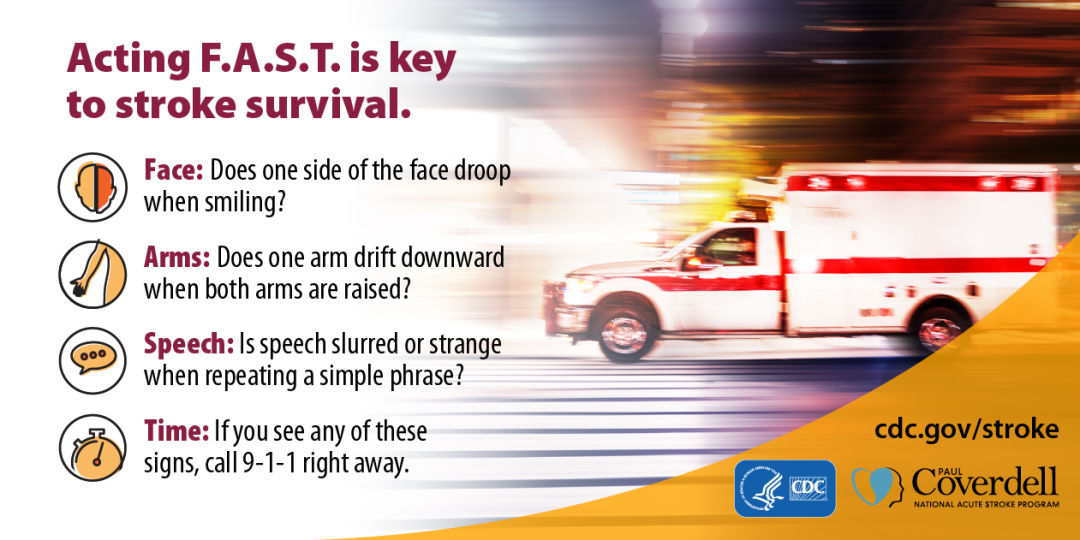When It Comes to Stroke, Think F-A-S-T
Strokes are one of the leading causes of death and disability in this country, where someone has a stroke every 40 seconds. May is Stroke Awareness Month and a good time to remember that strokes require F-A-S-T thinking.
Sometimes called a brain attack, a stroke occurs when the blood supply to the brain is interrupted or reduced, depriving brain cells of oxygen and nutrients. It may present with a wide range of symptoms that can affect the ability to speak, see, move, or feel. Prompt treatment can prevent a potentially devastating disability or death.
While the outcomes from stroke recovery continue to improve, the number of people having a stroke seems to be rising. That’s why it is so important to recognize the early warning signs. Luckily, the easiest way to recognize the signs of a stroke is to think F-A-S-T.
- Face: Does one side of the face droop when smiling?
- Arm: Does one arm drift down when both arms are raised?
- Speech: Is speech slurred or strange when repeating a simple phrase?
- Time: If any of these signs are present, call 9-1-1 immediately.

Getting treatment quickly can mean the difference between recovery and permanent disability, or even death. The longer the blood flow to the brain is restricted, the more damage is happening in the brain. It’s really pretty simple: Quick treatment means a better chance of recovery.
Soon after the blockage is treated, work begins on assessing the effects of the stroke. The stroke rehabilitation team evaluates strength, memory and comprehension, speech, and swallowing before identifying the rehab strategies—such as physical therapy, speech and cognitive therapy, and occupational therapy—that may be started.
In addition to these traditional rehab strategies, new approaches and technologies are gaining ground in the treatment of stroke. Robotics are being used to assist in rebuilding muscle strength and movement, as well as reform the pathways in the brain that move muscles. Researchers are also combining repetitive motion with electric and magnetic stimulation to create new pathways for these brain signals.
What’s more, researchers are learning that improvement is still possible many months, even years, after a stroke. People recovering from a stroke make their greatest gains in the first three to six months, but new research suggests that improvements may occur months and even years beyond this window.
Preventing Stroke
While advances continue to be made in stroke recovery and rehabilitation, the best option is to take steps to prevent a stroke from happening in the first place. While some factors, like age and genetics, are outside your control, there are risk factors for stroke that rest completely in your hands.
- Manage blood pressure.
- Stop smoking.
- Manage diabetes.
- Eat a brain healthy diet.
- Get moving.
- Manage cholesterol.
- Stop drinking or drink only in moderation.
- Treat atrial fibrillation.
We are lucky here on the Suncoast when it comes to quick treatment for a stroke. Suncoast region residents have many options to choose from with stroke treatment and rehabilitation programs.
- Lakewood Ranch Medical Center’s Stroke and Cerebrovascular Center offers a rapid-response Stroke Alert Team to evaluate and treat all stroke emergencies 24 hours a day, seven days a week.
- Sarasota Memorial Hospital has the only nationally recognized, state-certified Comprehensive Stroke Center in Sarasota County, with a wide range of specialists and the latest treatment options for people who suffer complex strokes, severe deficits, or multiple organ challenges, as well as one-of-a-kind stroke rehabilitation.
- Blake Medical Center has the first and only certified Comprehensive Stroke Center in Manatee County, with the ability to diagnose and treat stroke patients who require intensive medical and surgical care, specialized tests, or interventional therapies.
- Doctor’s Hospital of Sarasota maintains a Primary Stroke Center designation with The Joint Commission and follows the highest national standards for safety and care in the rapid response and treatment of stroke patients.
-
Manatee Memorial Hospital’s Stroke and Cerebrovascular Center also has a rapid-response Stroke Alert Team, and stroke patients receive specially designed services and treatments that focus on prevention and intervention, as well as rehabilitation and education.
The Brain Health Initiative (BHI), a 501(c)(3) nonprofit organization, is a cutting-edge approach to protecting brain health, promoting brain performance, and fighting brain illness across the lifespan. The BHI is creating brain healthy communities, cultures that foster brain health protective factors and address risk factors, thereby improving brain health and optimizing brain performance outcomes for the Florida Suncoast region and beyond. Join the BE BRAIN HEALTHY movement, because brain health matters, and lifestyle makes a difference.